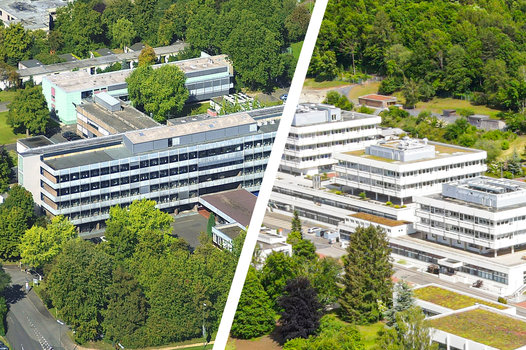The Max Planck Institutes (MPI) for Biophysical Chemistry and for Experimental Medicine will merge. The decision-making bodies of the Max Planck Society (MPS) approved the plan submitted by the two institutes on March 12. Formally, both institutions will be closed and a new MPI will be founded, keeping the existing Göttingen sites in Hermann-Rein-Straße and at Faßberg. The future institute will bring together natural science and basic medical research, promote disciplinary diversity and collaboration, and advance training of the next generations of excellent researchers. The new MPI’s foundation is scheduled for January 1, 2022.
“The new Max Planck Institute will be of exceptional scientific breadth, covering a spectrum from physics and chemistry via structural and cell biology to neuroscience and biomedical research. In this way, the institute can position itself better than before in the international research landscape. Basic research in the natural sciences can link even more effectively with medical research approaches,” reports Marina Rodnina, Managing Director of the MPI for Biophysical Chemistry. “The expansion of research topics, from basic natural science to translational preclinical research, will provide us with the scientific flexibility needed to address the most ardent questions in natural science of the 21st century,” adds Nils Brose, Managing Director at the MPI for Experimental Medicine.
The new research institute will have a total of 16 departments, each headed by a director. 13 departments will be located at the Faßberg site and 3 at the “City Campus” in Hermann-Rein-Strasse. It will be the largest institute of the MPS for the time being. All existing scientific groups, service facilities, and the administration with their respective budgets will be integrated into the future MPI. “This will enable us to exploit a wide range of synergy effects. Nevertheless, none of the current employees will lose their jobs as a result of the merger,” Brose emphasizes. “The name for our future institute has not yet been decided. We are already discussing suitable proposals,” Rodnina reports.
Ideal location for multidisciplinary research
"We want to make the new Max Planck Institute in Göttingen an even more attractive destination for outstanding scientists,” says Nobel laureate Stefan Hell, head of the Department of NanoBiophotonics at the MPI for Biophysical Chemistry. “The broader range of subjects will allow us to recruit yet undiscovered talents at all career stages and from a wide variety of disciplines. Above all, we want to attract those young researchers whose approaches promise to fundamentally change the direction of science. Their enthusiasm and fresh, critical thinking are key drivers of progress. This is one of the main reasons why we are making a concerted and strong case for the merger. There are very few places in Germany where such a multidisciplinary MPI can be established. Göttingen is without a doubt such a location,” the physicist emphasizes.
Contact
Dr. Ulrich Nauber
Scientific Officer to the Institute Management
+49 551 201-1590
unauber@...
Max Planck Institute for Biophysical Chemistry
Svea Viola Dettmer
Scientific Officer to the Institute Management
+49 551 3899-231
dettmer@...
Max Planck Institute for Experimental Medicine


